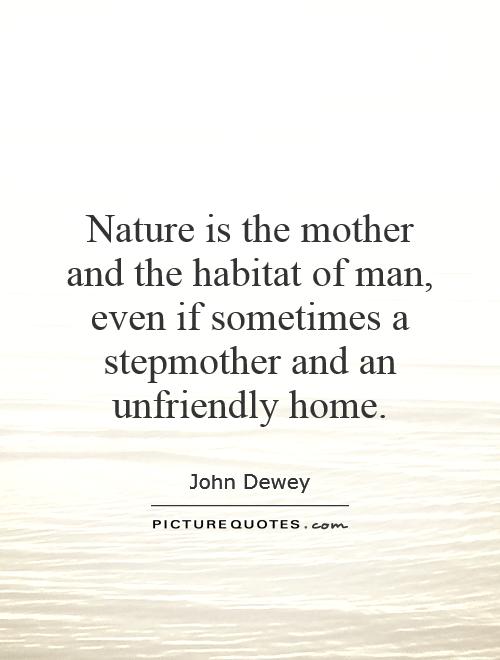Nature is the mother and the habitat of man, even if sometimes a stepmother and an unfriendly home

Nature is the mother and the habitat of man, even if sometimes a stepmother and an unfriendly home
John Dewey, a prominent American philosopher, psychologist, and educational reformer, believed that nature is not only the mother and habitat of man but also sometimes a stepmother and an unfriendly home. Dewey's philosophy emphasized the interconnectedness of humans and their environment, highlighting the importance of understanding and respecting nature in order to thrive as individuals and as a society.Dewey argued that humans are not separate from nature but rather deeply intertwined with it. He believed that nature provides the essential resources and conditions for human existence, serving as a source of sustenance, inspiration, and renewal. In this sense, nature can be seen as a nurturing mother, providing for our physical and spiritual needs.
However, Dewey also recognized that nature can be harsh and unforgiving at times. Natural disasters, environmental degradation, and climate change are all examples of how nature can be a stepmother and an unfriendly home to humans. Dewey understood that our relationship with nature is complex and multifaceted, encompassing both moments of harmony and moments of conflict.
Despite the challenges that nature may present, Dewey believed that humans have a responsibility to care for and protect the environment. He argued that a deep understanding of nature is essential for human flourishing, as it allows us to appreciate the interconnectedness of all living beings and the delicate balance of ecosystems. By respecting and preserving nature, Dewey believed that humans could create a more sustainable and harmonious relationship with the natural world.












 Friendship Quotes
Friendship Quotes Love Quotes
Love Quotes Life Quotes
Life Quotes Funny Quotes
Funny Quotes Motivational Quotes
Motivational Quotes Inspirational Quotes
Inspirational Quotes